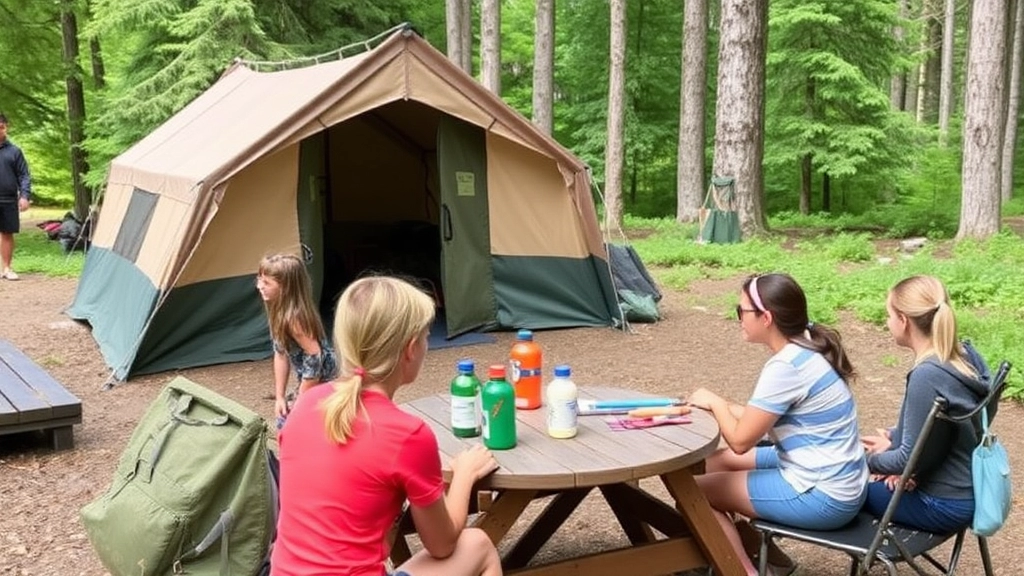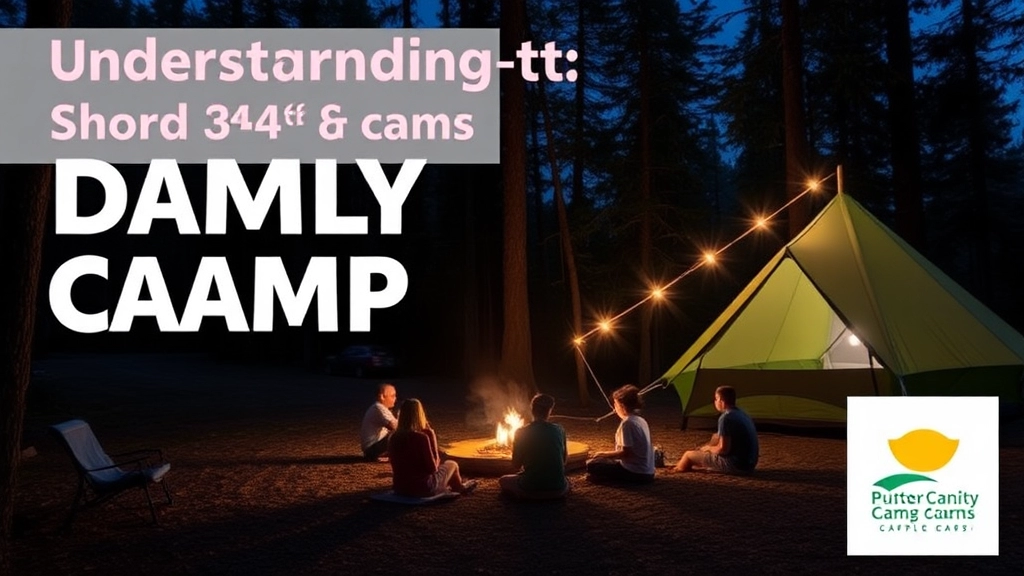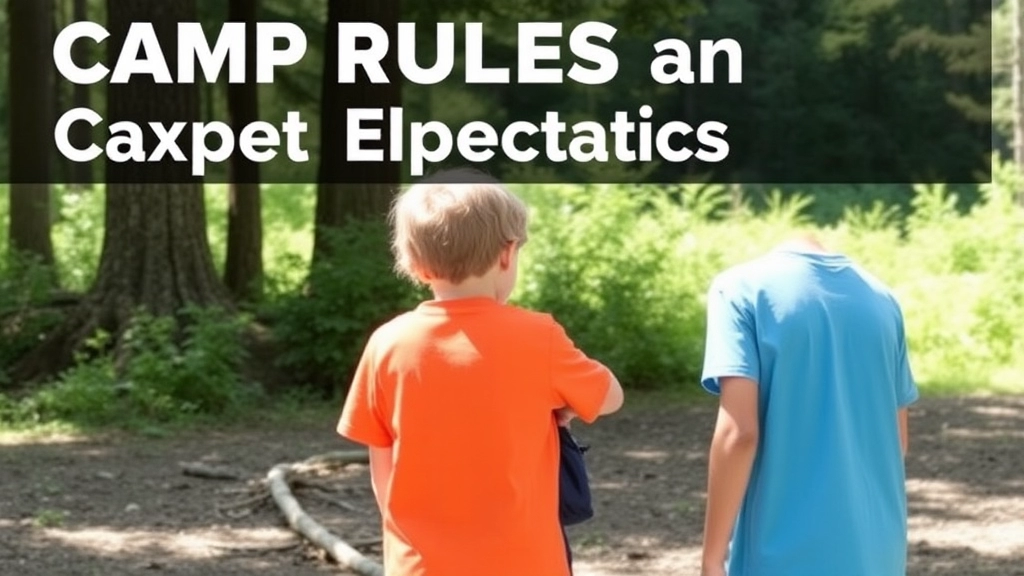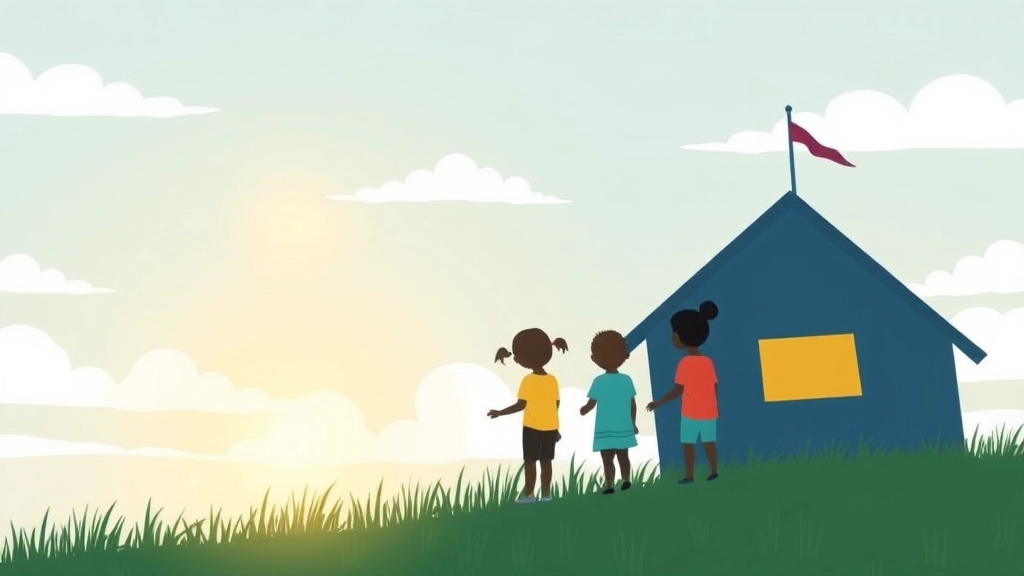Embarking on the First Day of Summer Camp
Embarking on the first day of summer camp is an exhilarating experience filled with excitement, curiosity, and a touch of nervousness. From packing essentials to navigating the camp’s facilities, this guide is designed to ease your transition and help you make the most of your first day. Whether you’re a first-time camper or a seasoned pro, these tips will ensure you’re well-prepared and ready to dive into the adventure.
What We’ll Cover
We’ll cover everything from essential packing tips and first impressions upon arrival, to meeting camp counselors and fellow campers, and understanding the daily camp schedule. You’ll also find advice on easing separation anxiety, learning camp rules, and adjusting to sleeping away from home. By the end of this guide, you’ll be equipped with the knowledge and confidence to embrace your camp experience fully.
Let’s Make Your First Day Unforgettable!
Getting Ready: Essential Packing Tips for the First Day
Alright, folks, let’s talk about a big question that’s probably buzzing in your mind: “What do I pack for the first day of camp?” I get it, packing can be a bit overwhelming. But don’t sweat it. We’re going to break it down, keep it simple, and make sure you’ve got everything you need.
The Basics: Must-Haves for Every Camper
Before we dive into the nitty-gritty, let’s cover the basics. Here’s a checklist of essentials every camper should pack:
- Clothing: Comfortable, weather-appropriate clothes. Think layers, because camp weather can be unpredictable.
- Footwear: Sturdy trainers for activities and a pair of flip-flops for the shower.
- Toiletries: Toothbrush, toothpaste, soap, shampoo, and deodorant. Don’t forget a towel!
- Bedding: Sleeping bag or sheets and a pillow. Some camps provide these, but it’s always good to check.
- Medications: If you take any, pack them in their original containers along with a copy of your prescription.
Pro Tips: What Seasoned Campers Never Forget
Now, let’s get into some of the finer details. These are the things that seasoned campers know to bring:
- Sunscreen and Bug Spray: Trust me, you don’t want to be the one covered in mosquito bites or sunburnt on day one.
- Reusable Water Bottle: Staying hydrated is key, and it’s eco-friendly.
- Flashlight or Headlamp: Essential for those late-night bathroom trips or campfire stories.
- Notebook and Pen: Great for jotting down memories or sketching out the day’s adventures.
Personal Touches: Making Your Space Feel Like Home
Packing a few personal items can make your camp experience even better. Here are some ideas:
- Photos of Family and Friends: A little piece of home can be comforting.
- Favourite Book or Journal: Perfect for some downtime or reflection.
- Small Games or Cards: Great for breaking the ice with new friends.
Packing Smart: Tips and Tricks
Here are some packing hacks to make your life easier:
Arriving at Camp: First Impressions and Settling In

Arriving at camp can be a mixed bag of emotions.
Excitement, nerves, curiosity, and a bit of fear all bundled together.
But don’t worry, you’re not alone.
Everyone’s feeling it too.
First things first: What’s the vibe?
As soon as you get off the bus or out of the car, take a deep breath.
Look around.
Smell the fresh air.
Feel the energy.
This place is going to be your new home for a bit.
Settling in might seem daunting, but here’s how to nail it:
- Unpack right away: Don’t live out of your suitcase.
- Make your bed: It’s your space now.
- Organise your stuff: Know where everything is.
Quick Tip: Put your favourite item (like a book or a photo) on your bedside. It’ll make the space feel more like yours.
Meeting the Camp Staff
You’re going to meet a lot of people, and it starts with the camp staff.
Why should you care?
These folks are your go-to for everything.
Lost? Ask them.
Hungry? They know where the snacks are.
Feeling homesick? They’ve got your back.
When you first meet them:
- Introduce yourself: Be friendly, even if you’re shy.
- Ask questions: They expect it and it shows you’re engaged.
- Remember names: It helps build connections faster.
Connecting with Fellow Campers
Making friends on day one can set the tone for your entire camp experience.
Here’s a simple approach:
- Smile and say hi: It’s that easy.
- Ask open-ended questions: “What are you most excited about?” works wonders.
- Join in: Whether it’s a game, a chat, or unpacking, dive in.
Pro Tip: Find common ground. Maybe you both love the same sport or hobby. Instant connection.
First Impressions Matter, But Don’t Stress
Everyone’s in the same boat, feeling the same jitters.
Remember:
- Be yourself: Authenticity wins.
- Stay positive: A good attitude is contagious.
- Be open: New experiences, new people, new you.
Meeting Camp Counselors and Fellow Campers: Building Early Friendships
Stepping into camp for the first time can be a rollercoaster of emotions. You’re excited, maybe a bit nervous, and full of questions like, “Who will my friends be?” and “Will the counselors be cool?” Let’s break it down and make this journey smoother for you.
First Impressions Matter
When you first meet your camp counselors and fellow campers, it’s all about making a positive impression. Think of it like the first day of school but with more fun and less homework. Your camp counselors are there to help you settle in and guide you through the camp experience. They’re like your big brothers and sisters for the duration of camp.
- Smile and Introduce Yourself: It sounds simple, but a smile goes a long way. When you meet someone new, say your name and ask for theirs. It’s a great icebreaker.
- Be Open and Friendly: Everyone’s in the same boat, feeling a bit out of their comfort zone. Being approachable can help others feel at ease.
- Ask Questions: Don’t be shy to ask your counselors about their camp experiences. It’s a great way to learn more and get tips on making the most of your time.
Building Bonds Early On
The first few days are crucial for forming friendships that could last a lifetime. Here’s how to make those connections:
- Participate in Group Activities: Join in on games and activities. It’s the easiest way to meet people and start conversations.
- Share Your Interests: Talk about your hobbies and interests. You might find someone who loves the same things you do.
- Be a Team Player: Whether it’s a team sport or a group project, showing that you’re cooperative and supportive can help you bond with others.
Counselors Are Your Go-To Guides
Your camp counselors are there for more than just supervision. They’re your mentors and can help you navigate any challenges you face.
- Seek Their Advice: If you’re feeling homesick or unsure about something, talk to your counselor. They’ve been trained to help you through these feelings.
- Follow Their Lead: Watch how they interact with others and follow their example. They’re pros at making everyone feel included.
- Respect and Trust: Building a good relationship with your counselors starts with respect. Trust their guidance and be open to their suggestions.
Real Stories, Real Connections
I remember my first day at camp like it was yesterday. I was nervous about meeting new people, but my counselor, Jamie, made it easy. He introduced me to a group of campers who were also into football. We hit it off right away, and by the end of the day, it felt like we’d known each other for years. That first connection was all it took to make camp feel like home.
If you’re looking for more tips on how to ace your camp experience, check out our Top Summer Camp Interview Questions. And for those interested in sports, don’t miss our guide on Flag Football Summer Camp for some great insights!
Navigating the Camp: Facility Tours and Orientation

Feeling a bit lost on your first day at camp? Worried about finding your way around?
I get it.
Let’s break it down.
First Impressions Matter
When you arrive, the camp might seem like a maze. But don’t stress.
That’s what the facility tour is for.
You’ll get a lay of the land and see where all the action happens.
What to Expect on the Tour
- Main Hall: Your go-to for meals and gatherings.
- Cabins: Where you’ll crash at night.
- Activity Zones: Think sports fields, arts and crafts huts, and the swimming pool.
- Nature Trails: Perfect for hikes and exploring.
Orientation: Your Roadmap to Fun
Orientation isn’t just about rules.
It’s your chance to ask questions and get the lowdown on camp life.
Key Points to Note:
- Daily Schedule: Know when and where things happen.
- Safety First: Learn emergency exits and procedures.
- Meet the Team: Get to know who’s who among the staff.
Pro Tip: Take notes or snap pics on your phone. It’s a quick way to remember spots.
Feeling Overwhelmed?
You’re not alone.
Everyone’s in the same boat.
Share a laugh with a fellow camper or ask a counsellor for help.
They’ve got your back.
Why It’s Important
Knowing your way around boosts confidence.
You’ll feel more at home and ready to dive into activities.
And hey, you might even spot a secret hangout spot or two.
Icebreaker Activities: How Camps Use Games to Help Campers Connect
Alright, let’s talk about something that might be on your mind: icebreaker activities. Ever wondered how camps make those first awkward moments less, well, awkward? It’s all about the games, my friend.
Why Icebreakers Matter
First days can be nerve-wracking. New faces, unfamiliar surroundings, and that nagging feeling of “Will I fit in?” Camps get it. They know the faster you feel at home, the better your experience will be. That’s where icebreaker activities come in. These aren’t just random games; they’re carefully chosen to help you connect with fellow campers quickly.
Popular Icebreaker Games
- Name Games: Simple but effective. Think of “Name Bingo” or “Two Truths and a Lie.” These games help you remember names and learn a bit about each other.
- Team Challenges: Activities like “Human Knot” or “Scavenger Hunts” push you to work together. You’ll find yourself laughing and strategizing with people you just met.
- Creative Introductions: Sometimes, camps get creative. Ever introduced yourself with a dance move or a silly voice? It’s goofy but drops the tension like a hot potato.
Real Stories: Icebreakers in Action
Let me share a quick story. On my first day at camp, we played a game called “Campfire Stories.” Each person added a line to a story. By the end, we had a hilarious, nonsensical tale that had everyone in stitches. It was the perfect way to break the ice and get everyone chatting.
Benefits of Icebreaker Activities
- Instant Connections: These games help you find common ground fast.
- Boosted Confidence: You get to participate without the pressure of one-on-one conversations.
- Shared Memories: The silliness and fun create shared experiences that you’ll talk about for days.
Tips to Get the Most Out of Icebreakers
- Be Open: Dive in with an open mind. The more you put in, the more you get out.
- Participate: Even if it feels a bit awkward at first, join in. Everyone’s in the same boat.
- Have Fun: Remember, it’s all about breaking the ice. Don’t take it too seriously.
For more ideas on making your camp experience unforgettable, check out our fun activities at summer camp and learn about the best summer camp week themes for an amazing time!
Understanding the Daily Camp Schedule: From Breakfast to Lights Out

Ever wondered what a day at camp looks like?
Worried about fitting in or keeping up?
Don’t sweat it.
Let’s break down the daily camp schedule so you can hit the ground running.
Breakfast: The Most Important Meal
First up, breakfast.
You’ll kick off the day with a hearty meal.
Think eggs, toast, cereal, and maybe some fruit.
Pro tip: Fuel up. You’ll need the energy.
Morning Activities: Dive Right In
After breakfast, it’s straight into morning activities.
Could be swimming, hiking, or arts and crafts.
Whatever it is, give it your all.
Quick tip: Don’t be afraid to try new things. This is your chance.
Lunch: Refuel and Recharge
By lunchtime, you’ll be ready to eat again.
Lunch is usually a mix of sandwiches, salads, and maybe some hot dishes.
Heads up: Hydrate. Keep that water bottle handy.
Afternoon Fun: Keep the Momentum Going
Post-lunch, it’s time for afternoon activities.
More games, maybe a team sport, or some quiet time for reading.
Pro tip: Balance your energy. Know when to go all out and when to chill.
Snack Time: Quick Energy Boost
Mid-afternoon, there’s usually a snack.
Fruit, granola bars, or something light.
Remember: A little snack can go a long way.
Evening Activities: Wind Down the Day
As the sun sets, evening activities kick in.
Campfires, talent shows, or group games.
Pro tip: Engage. This is where friendships really form.
Dinner: Ending the Day Right
Dinner is your last big meal.
Expect something warm and filling.
Heads up: Chat with new friends. This is your social hour.
Lights Out: Rest and Recharge
Finally, it’s lights out.
Time to hit the bunk and get some rest.
Pro tip: Bring a comfort item from home. It helps.
Easing Separation Anxiety: Tips for First-Time Campers and Parents
Separation anxiety is a real deal, right? Especially when it’s your kid’s first time heading off to camp. You’re probably wondering, âHow will they cope without me?â and âWill they make friends?â Trust me, these worries are totally normal. Let’s break it down and tackle this head-on.
Understanding Separation Anxiety
First off, separation anxiety is common. Both kids and parents feel it. It’s that gnawing worry about being apart. But hey, it’s also a sign that you care deeply about each other. So, how do we ease this anxiety? Let’s dive into some practical tips.
Tips for Parents
1. Preparation is Key:
- Talk About Camp: Start chatting about camp weeks before the big day. Share stories, show them pictures, and discuss the fun activities they’ll get to do.
- Pack Together: Involve your child in the packing process. It makes them feel more in control and excited about their adventure.
2. Stay Positive:
- Your Attitude Matters: Kids pick up on your vibes. If you’re confident and excited, they’ll likely mirror that.
- Avoid Long Goodbyes: Keep farewells short and sweet. Lingering can heighten anxiety for both of you.
3. Stay Connected:
- Letters and Emails: Most camps allow parents to send letters or emails. Write encouraging notes, but avoid phrases that might make them homesick.
- Care Packages: Send small care packages with their favourite snacks or a little memento from home.
Tips for Campers
1. Bring a Comfort Item:
- Familiar Objects: Pack a favourite stuffed animal, blanket, or even a family photo. These items can provide comfort during tough moments.
2. Stay Busy:
- Dive into Activities: The more engaged you are in camp activities, the less time you’ll have to feel homesick. Try everything from archery to arts and crafts.
3. Talk About Your Feelings:
- Open Up: If you’re feeling anxious, talk to your camp counsellor or a new friend. Chances are, they’ve felt the same way.
Real Stories: Overcoming Separation Anxiety
Let me share a quick story. Last summer, my niece, Emma, went to camp for the first time. She was super nervous and almost backed out. But her mum packed her favourite bedtime storybook and wrote a letter for each day she’d be away. Emma read those letters every night and felt like her mum was right there with her. By the end of the week, she didn’t want to come home!
Final Thoughts
Separation anxiety is a hurdle, but it’s one you can jump over with the right mindset and tools. Remember, the goal is to make camp a positive, growth-filled experience for your child. And hey, it’s okay to miss each otherâthat’s part of the journey. Embrace it, prepare for it, and watch your child thrive.
So, what are your thoughts? How do you plan to ease separation anxiety for your first-time camper? Share your tips and stories in the comments below!
For more information on preparing for camp, check out our Ultimate Packing Guide and discover the Ultimate Guide to Summer Track Camps for more tips and ideas.
Camp Rules and Expectations: What Every Camper Needs to Know

Worried about camp rules?
Yeah, me too.
Let’s break it down together.
First things first—rules are here to keep us safe and make sure everyone has a blast.
Why do we even need rules?
- Safety: No one wants a broken arm or a lost camper.
- Fairness: Everyone gets a turn.
- Fun: Rules make sure the fun doesn’t turn into chaos.
Basic Rules You’ll Probably Hear
- Stay with your group: Wandering off isn’t just annoying; it’s dangerous.
- Respect others: No one likes a bully.
- No phones: Yep, you read that right. Time to disconnect.
- Lights out means lights out: Sleep is crucial, even if you’re not tired.
What Happens If You Break a Rule?
- First Offense: Usually a warning.
- Second Offense: Maybe a chat with a counsellor.
- Third Offense: Parents might get a call.
Real Talk: What Does This Mean for You?
- Follow the dress code: Leave the fancy stuff at home.
- Be on time: Latecomers miss out.
- Keep it clean: Your cabin, your stuff, and yourself.
Stories from the Campfire
One time, a kid named Jake thought he could sneak out after lights out. He got lost, and it took hours to find him. Lesson learned: rules aren’t just for fun; they’re for your safety.
Quick Tips to Remember
- Listen up: Pay attention during orientation.
- Ask questions: If you’re unsure, just ask.
- Buddy up: Having a friend helps you stick to the rules.
The First Night: Adjusting to Sleeping Away from Home
Alright, let’s talk about the elephant in the room: the first night at camp. This is where the rubber meets the road, and for many first-time campers, it’s a big deal. How do you get comfortable sleeping away from home for the first time? Let’s dive in.
Real Talk: Common Worries
You’re probably wondering:
- Will I be able to sleep?
- What if I get homesick?
- What if my bunkmates snore like freight trains?
These worries are totally normal. Trust me, everyone has them. But here’s the good news: there are ways to make the first night smoother.
Tips for a Better First Night
1. Bring Comfort Items
- Favourite Pillow or Blanket: Having something familiar can make a world of difference.
- Stuffed Animal: Yes, even if you’re older, no shame in bringing a small stuffed friend.
2. Create a Bedtime Routine
- Read a Book: Something light and fun to distract your mind.
- Listen to Music or a Podcast: Use headphones to avoid disturbing others.
3. Talk to Your Bunkmates
- Icebreakers: Share funny stories or play a quick game. This helps you bond and feel more at ease.
- Set Expectations: If you’re a light sleeper, let them know. They’ll appreciate the heads-up.
Handling Homesickness
Homesickness is real, but it doesn’t have to ruin your night. Here’s how to tackle it:
1. Stay Busy During the Day
- Engage in Activities: The busier you are, the less time you’ll have to feel homesick.
- Make Friends: Building connections can ease the longing for home.
2. Write Letters or Journal
- Express Your Feelings: Sometimes, putting your thoughts on paper can help you process them.
- Stay Positive: Focus on the fun experiences you’re having.
3. Speak to a Counselor
- They’re Trained: Camp counselors are there to help. Don’t hesitate to talk to them if you’re struggling.
The First Night Routine
1. Evening Activities
- Campfire Stories or Songs: These are designed to wind you down and create a sense of community.
- Quiet Time: Most camps have a designated quiet time to help everyone settle in.
2. Lights Out
- Stick to the Schedule: Camps have a lights-out time for a reason. Following it helps everyone get enough rest.
- Respect Others: Keep noise to a minimum. Everyone’s in the same boat.
Embracing the Adventure
The first night is just the beginning. Embrace the adventure, and remember, everyone else is going through the same thing. By morning, you’ll already feel more at home and ready to tackle the day’s activities.
Looking for more tips? Check out our Ultimate Guide to Kids Summer Camps and discover the best summer camps in Seattle for kids.
Embracing the Adventure: How to Make the Most of Your First Day at Camp
Feeling a bit anxious about your first day at camp?
You’re not alone.
Everyone’s got those first-day jitters.
But hey, let’s turn that nervous energy into excitement.
Here’s how to make your first day at camp unforgettable.
Start with a Positive Mindset
Think about this:
- Why did you sign up for camp in the first place?
- Adventure? New friends? Learning something cool?
Keep that in mind.
Dive Right In
Don’t wait around.
- Jump into activities.
- Join a game.
- Introduce yourself.
Use the Buddy System
Find a buddy.
Having someone to navigate the day with makes everything smoother.
You’ll have each other’s backs.
Ask Questions
Confused about something?
- Ask.
- Counsellors are there to help.
- Other campers might have the same questions.
Get Involved in Icebreakers
Icebreaker activities are gold.
They’re designed to help you connect.
Don’t just stand on the sidelines.
Participate.
Explore the Camp
Take the tour seriously.
- Know where everything is.
- Dining hall? Check.
- Cabins? Check.
- Activity zones? Check.
Follow the Schedule
Stick to the camp schedule.
It’s there to keep things flowing.
From breakfast to lights out, know what’s next.
Stay Open-Minded
Be open to new experiences.
You might discover a new hobby or talent.
Handle Homesickness
Feeling a bit homesick?
It’s normal.
- Talk to a counsellor.
- Write a letter home.
Respect the Rules
Camp rules are for your safety.
- Understand them.
- Follow them.
End the Day with Reflection
Before bed, take a moment.
- Think about your day.
- What did you enjoy?
- What can you look forward to tomorrow?
For more tips on making the most of your camp experience, check out our guide to fun activities at summer camp. If you’re still deciding on the perfect camp, you might want to explore our top summer camps with virtual tours to find the best fit for you.
FAQs for the First Day of Summer Camp
What should I expect when I first arrive at camp?
Arriving at camp can bring a mix of emotions like excitement, nerves, curiosity, and a bit of fear. Don’t worry, everyone’s feeling it too. Take a deep breath, look around, and feel the energy. This place will be your new home for a bit.
How can I settle in quickly?
Unpack right away, make your bed, and organize your stuff. This helps you feel more at home and know where everything is. A quick tip: Put your favorite item, like a book or a photo, on your bedside to make the space feel more like yours.
Why is it important to meet the camp staff?
The camp staff are your go-to for everything. Whether you’re lost, hungry, or feeling homesick, they’ve got your back. Introduce yourself, ask questions, and try to remember their names to build connections faster.
How can I make friends on the first day?
Smile and say hi, ask open-ended questions like “What are you most excited about?”, and join in on activities. Finding common ground, like a shared hobby or sport, can help form instant connections.
What should I know about the facility tours and orientation?
The facility tour helps you get a lay of the land, showing you important spots like the main hall, cabins, activity zones, and nature trails. Orientation covers the daily schedule, safety procedures, and introduces you to the staff. Take notes or snap pics on your phone to remember everything.
What does a typical day at camp look like?
The day starts with breakfast, followed by morning activities, lunch, afternoon activities, a snack, evening activities, dinner, and finally, lights out. Each meal is a chance to refuel, and activities range from sports to arts and crafts. Engage in evening activities to form friendships and bring a comfort item from home to help with the night.
What are some common camp rules I should know?
Rules are there to keep everyone safe and ensure a fun time. Common rules include staying with your group, respecting others, no phones, and adhering to lights out. Breaking rules usually results in a warning, a chat with a counselor, or a call to parents.
Why are camp rules important?
Rules ensure safety, fairness, and fun. They prevent chaos and help everyone have a good time. Following the dress code, being on time, and keeping your space clean are also important rules to follow.
What should I do if I feel overwhelmed?
Feeling overwhelmed is normal. Share a laugh with a fellow camper or ask a counselor for help. They’re there to support you. Remember, everyone’s in the same boat, and knowing your way around boosts your confidence.
How can I make the most of my camp experience?
Be yourself, stay positive, and be open to new experiences and people. Engage in activities, ask questions during orientation, and make an effort to connect with others. This will help you feel more at home and ready to dive into all the fun camp has to offer.
References
-
First Day at Camp: Tips for Campers
-
What to Expect at Summer Camp
-
Summer Camp Guide: Helping Kids Adjust

